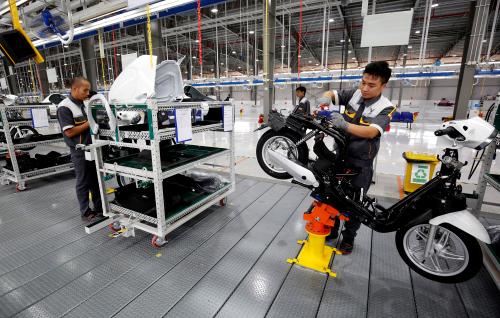This blog post is the first of a four-part series about the year ahead in economic development, including topics on the future of mobility, global growth forecasts, and the end of aid.
The world economy is entering 2018 on a high note. Economic growth in the United States, the European Union, Japan, and China accelerated in 2017, and large emerging economies are regaining momentum. Global growth forecasts for 2018 are upward of 3.1 percent. Stock markets have reached record highs. Unemployment is down and wages are starting to rise.
So after almost a decade of concern over slow recovery and fragile financial markets, capitalism looks to have recovered its mojo. Surely a cause for celebration, but pessimists (including most economists) are confounded.
Yet not all news is good, and 2018 may yet turn out to be the year when a great battle of ideas takes place between those who argue for unfettered markets and those who would try to save capitalism from itself.
The first battle is about getting prices right. Capitalism is a great engine, but the road it takes is signposted by prices. Get the prices wrong and the engine moves fast but in the wrong direction. And, going into 2018, many prices are wrong. A few examples: the price of carbon, the price of dumping plastic into oceans, and the price of unpaid family care. As a broad proposition, there is a paradox in our system; in most countries, labor is taxed and fossil fuels are subsidized, while politicians and citizens in these countries insist they want more jobs and less pollution. With carbon emissions rising to record levels and employment rates falling, the price distortions are taking a toll. In 2017 alone, natural disasters cost America $306 billion—almost equal to what economic growth last year added to GDP ($364 billion).
The second battle is around competition. Capitalism delivers for society as a whole when there is strong competition. It delivers for individual companies and their shareholders when competition is weak. Today’s economies are seeing more concentration. In the U.S., 75 percent of industries have become more concentrated over the past two decades, generating abnormal returns. With more companies enjoying economic rents from patent and copyright returns, competition is becoming harder to achieve and winner-take-all companies are emerging.
The third battle is over capitalism and globalization. Large companies of course have long favored globalization, but, as Harvard economist Dani Rodrik has argued, the pressure to succeed in global competition can undercut the very social, legal, and political institutions that give capitalism legitimacy. Brexit is one example of this pressure at work. The decision to leave was not a way of retreating from global trade; quite the contrary, during current Brexit negotiations, the United Kingdom has clearly shown that it seeks to maximize opportunities for trade. Rather, the decision to leave was built upon a narrative of restoring sovereignty and control over domestic institutions to the British Parliament rather than to Brussels. More recently, Rodrik argues that the stability for investors based on a rules-based order might actually be an obstacle to experimentation, in that different forms of a social compact would better combine globalization and sovereignty.
The fourth battle is over the usefulness of GDP as a metric of well-being. Capitalism undoubtedly delivers strong economic growth. But as my colleague Carol Graham has shown in her recent book, “Happiness for All?” and as discussed by David Blanchflower at Dartmouth and Andrew Oswald at the University of Warwick, economic growth sometimes hurts those who are left behind. Folks at or near the bottom of the economic ladder may feel stressed, insecure, and discouraged because of concerns over fairness, inequality, and lack of hope. Capitalism or markets will not solve these issues. Yet, these factors are very real and generating a gap between economic prosperity and well-being. For example, in the U.S., one of the richest countries in the world, life expectancy is now declining among certain demographic groups, mostly due to the opioid crisis. As a possibly shocking comparison, U.S. citizens are less optimistic than in Peru, despite the vast gap in terms of income.
While these battles are not new, the costs of taking a laissez-faire attitude toward capitalism have steadily risen and are now dominating the discourse. Left unaddressed, the negative outcomes of the global economic system could trigger a backlash of irrational and unstable populism that would be highly detrimental to any well-functioning capitalist society.
Therefore, 2018 offers an opportunity to address some of capitalism’s built-in flaws. Will policymakers take up the challenge? It will be hard. A frequent rebuttal to critics of capitalism is that it is the worst system except for all others that have been tried. Individual countries are unlikely to drive systemic change—this is a case where collective action on a negotiated path forward is most desirable. Yet wholesale change is also the least likely scenario. Instead, in all probability, 2018 will bring continued experimentation with state capitalism and state-captured capitalism; shareholder societies and stakeholder societies; countries investing in renewables and those resisting them; and multilateralists and nationalists. It promises to be an interesting year.







Commentary
Can capitalism be saved from itself?
January 16, 2018